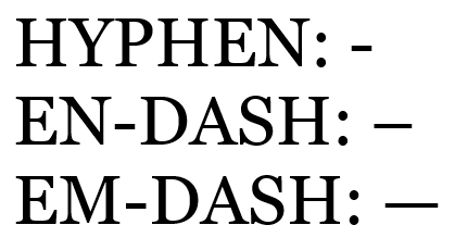- 3-minute read
- 12th May 2016
How to Use Hyphens and Dashes in an Essay
Hyphens and dashes are basically the same, right? Just little lines used to connect words? Well, sort of, but there are important distinctions you should keep in mind when writing an essay.
What exactly is the difference? Let us lay it on the line for you (that was a tenuous attempt at a pun, but it’s hard to add levity to a blog post about punctuation).
Hyphens
Hyphens ( – ) are typed with the key next to ‘0’ on your keyboard and generally used to connect two words or link syllables in a single word.
In some cases, this is because a compound word is conventionally hyphenated:
- Topsy-turvy
- Daughter-in-law
- Self-employed
At other times it’s because a hyphen is required to preserve clarity, such as when adding a prefix causes a letter collision (e.g. the double ‘i’ in ‘anti-inflammatory’).
Hyphens are also used when constructing phrasal adjectives. This is usually only necessary when the adjective occurs before the word it modifies (e.g. ‘a well-known politician’, but ‘the politician is well known’). But some adjectives are conventionally hyphenated regardless of where they appear in the sentence (e.g. both ‘an error-free paper’ and ‘the paper is error-free’ are correct since ‘error-free’ is almost always written with a hyphen).
A hanging or suspended hyphen can be used when two compound terms contain the same second element. For instance, a company might say ‘we offer five- and ten-year mortgages’. Here, the hyphen after ‘five’ shows that we mean ‘five-year and ten-year mortgages’ but didn’t want to repeat ‘year’. This can also be done with closed compounds, such as in ‘under- and overground trains’.
Hyphens are also used for writing out compound numbers, from twenty-one to ninety-nine.
It’s often worth checking whether a compound word really needs a hyphen, as conventions change over time. For instance, many people now write ‘e-mail’ as just ‘email’ or spell ‘co-operate’ as just ‘cooperate’.
Find this useful?
Subscribe to our newsletter and get writing tips from our editors straight to your inbox.
En and Em Dashes
There are two kinds of dash you might need to use, en dashes and em dashes, each of which has a specific purpose:
- En Dashes
An en dash ( – ) is a little longer than a hyphen. Its main use is to indicate a range of values (e.g. people aged 18–21), a sequence (e.g. August–October, pp. 78–85, A–Z), or a connection (e.g. Anglo–American relations).
However, you can also use spaced en dashes to set apart a few words in a sentence – like this bit – before resuming the original thought.
Microsoft Word automatically formats hyphens as en dashes when they’re inserted between words with a space (e.g. ‘1 – 5’ changes to ‘1 – 5’).
- Em Dashes
An em dash ( — ) is longer than either a hyphen or an en dash. As with en dashes, we can use em dashes to add an interruption to a sentence—like this one—before resuming a thought. Note, too, that em dashes are unspaced.
This style of dash is more common in American English. Ultimately, though, whether to use em dashes or en dashes to set apart part of a sentence is largely a matter of preference as long as you are consistent.
The Difference
If you look carefully, hyphens and dashes differ in appearance as well as their use, so picking the right one in any given situation is vital: -/–/—.
Since conventions differ slightly from place to place, one thing you should do to ensure accuracy is check your style guide before starting an essay. However, the most important thing is to use these marks consistently throughout your document.